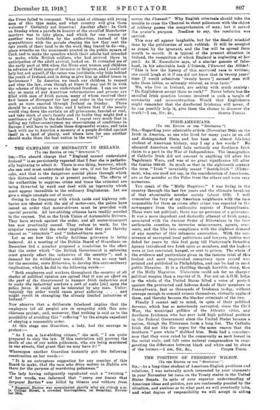IRISH-AMERICANS.
[To THE EDITOR OF THB " SPECTATOR.") SIR,—Regarding your admirable article (November 29th) on the Irish in America, as one who lived for many years in an old and distinguished State, and has been an almost life-long student of American history, may I say a few words ? No educated American would take seriously any Southern Irish claim to a part in the War of Independence. The immigration of Catholic Irish did not amount to anything till after the Napoleonic Wars, and was of no great significance till after the famine 1848-49. So much so that in the eighteenth century the term "Irish " invariably meant " Scotch-Irish " (Ulstermen), who, one need not say, in the consideration of Americans, are as far asunder as the Poles from the others and were very numerous.
You speak of the " Molly Maguires." I was living in the country through the last few years and the ultimate break-up of that abominable murder society (about 1879). I well remember the fury of my American neighbours with the race responsible for them as crime after crime was reported in the newspapers from the anthracite regions of Pennsylvania. These were not political; there was no pretence of a grievance. It was a mere impudent and dastardly attempt of Irish gangs, associated with the Ancient Order of Hibernians in the four anthracite counties, to terrorize mine-owners, agents, overseers, and the like into compliance with the slightest demand of any member of this infamous association. With the connivance of corrupted local politicians and lawyers, justice was defied for years by this foul gang till Pinkerton's Detective Agency introduced two Irish spies as members, and the leaders were at last convicted, hanged, or sent to prison. The whole of the evidence and particulars given in the famous trial of this foulest and most unprovoked conspiracy upon record was printed and published in Philadelphia, and can be had in most public libraries. It is a thrilling though horrible story, that of the Molly Maguires. Ulstermen could ask for no sharper political weapon than a reprint of it. For not an A.O.H. lodge in the whole of the United States lifted a voice of protest against the protracted and hideous deeds of their members in Pennsylvania, just as thousands of Irishmen to-day, without courage enough to commit crimes themselves, virtually applaud them, and thereby become the blacker criminals of the two.
Finally I cannot call to mind, in spite of their political
fervour, which has so notoriously corrupted, since the Civil War, the municipal politics of the Atlantic cities, any Southern Irishman who has ever held high political position in the Federal Government since the United States became a nation, though the Ulstermen form a long list.. The Catholic Irish did not like the negro for the same reason that the Southern " poor white " disliked him. Both had a consciousness that they were rated by the community as next lowest in the social scale, and felt some natural compensation in exaggerating the difference between black and white and by abuse
of the former.—I am, Sir, &c., CuiQul PORTE.


















































 Previous page
Previous page